Haddad W.M. Nonlinear Dynamical Systems and Control: A Lyapunov-Based Approach
Подождите немного. Документ загружается.

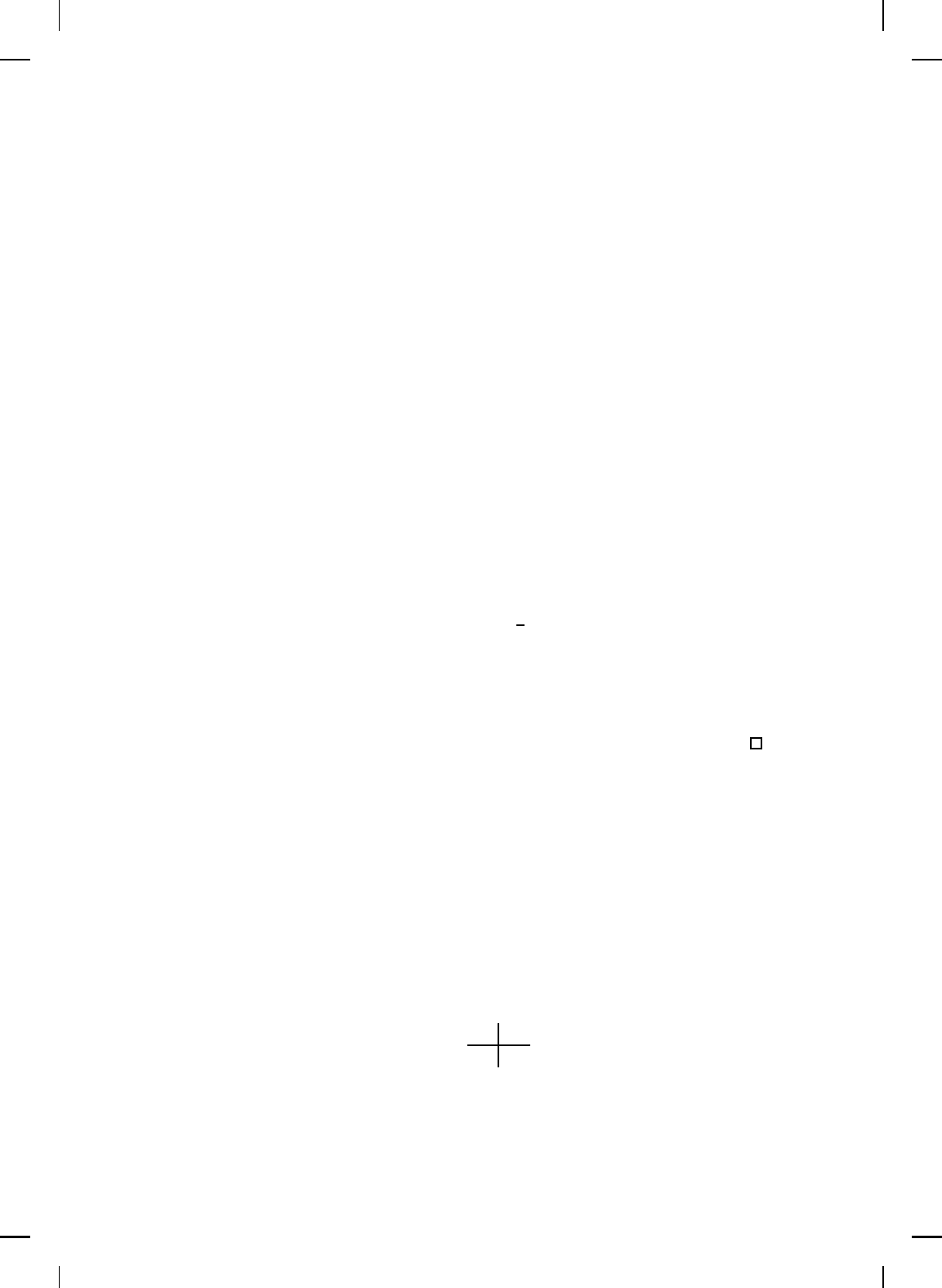
NonlinearBook10pt November 20, 2007
STRUCTURED PARAMETRIC UNCERTAINTY 725
equivalent to
He[Z(ω)(M
−1
+ G(ω)(I + M
1
G(ω))
−1
)] > 0.
Now, premultiplying and postmultiplying the above inequality by I +
G
∗
(ω)M
1
and I + M
1
G(ω) yields
He[(I + G
∗
(ω)M
1
)Z(ω)(M
−1
+ M
−1
M
1
G(ω) + G(ω))] > 0. (12.21)
Since N(· ) ∈ N and M
1
, M
2
∈ ∆ it f ollows that N M
1
= M
1
N and NM
2
=
M
2
N. Thus, NM = M N, and hence, N M
−1
= M
−1
N. Using these
relations (12.21) simplifies to
He[DM
−1
+ 2DM
−1
M
1
G(ω) + G
∗
(ω)M
1
DM
−1
M
1
G(ω) + DG(ω)
+G
∗
(ω)DM
1
G(ω)] > He[NG(ω)]. (12.22)
Now, forming x
∗
(12.22)x yields
x
∗
He[DM
−1
+ 2DM
−1
M
1
G(ω) + G
∗
(ω)M
1
DM
−1
M
1
G(ω)
+DG(ω) + G
∗
(ω)DM
1
G(ω)]x
> He[x
∗
NG(ω)x]
= −x
∗
G
∗
(ω)He[∆N]G(ω)x.
Since N(· ) ∈ N, it follows that He[∆N ] =
2
(∆N − N∆) = 0, and hence,
x
∗
He[DM
−1
+ 2DM
−1
M
1
G(ω) + G
∗
(ω)M
1
DM
−1
M
1
G(ω)
+DG(ω) + G
∗
(ω)DM
1
G(ω)]x > 0,
which contradicts (12.20). Consequently, det (I + G(ω)∆) 6= 0 for all ∆ ∈
∆.
For the next result we assume that the feedback interconnection of
G(s) and ∆ is well posed, that is, det[I + G(∞)∆] 6= 0 for all ∆ ∈ ∆.
Theorem 12.1. Suppose G
s
(s)
△
= (I + G(s)M
1
)
−1
G(s) is asymptoti-
cally stable. If there exists Z(·) ∈ Z such that
He [Z(s)(M
−1
+ G
s
(s))] > 0, (12.23)
for all s = ω, ω ∈ R ∪ ∞, then the negative feedback interconn ection of
G(s) and ∆ is asymptotically stable for all ∆ ∈ ∆.
Proof. Let ∆ ∈ ∆ and
G(s) ∼
A B
C D
be minimal so that the negative f eedback interconnection of G(s) and ∆ is
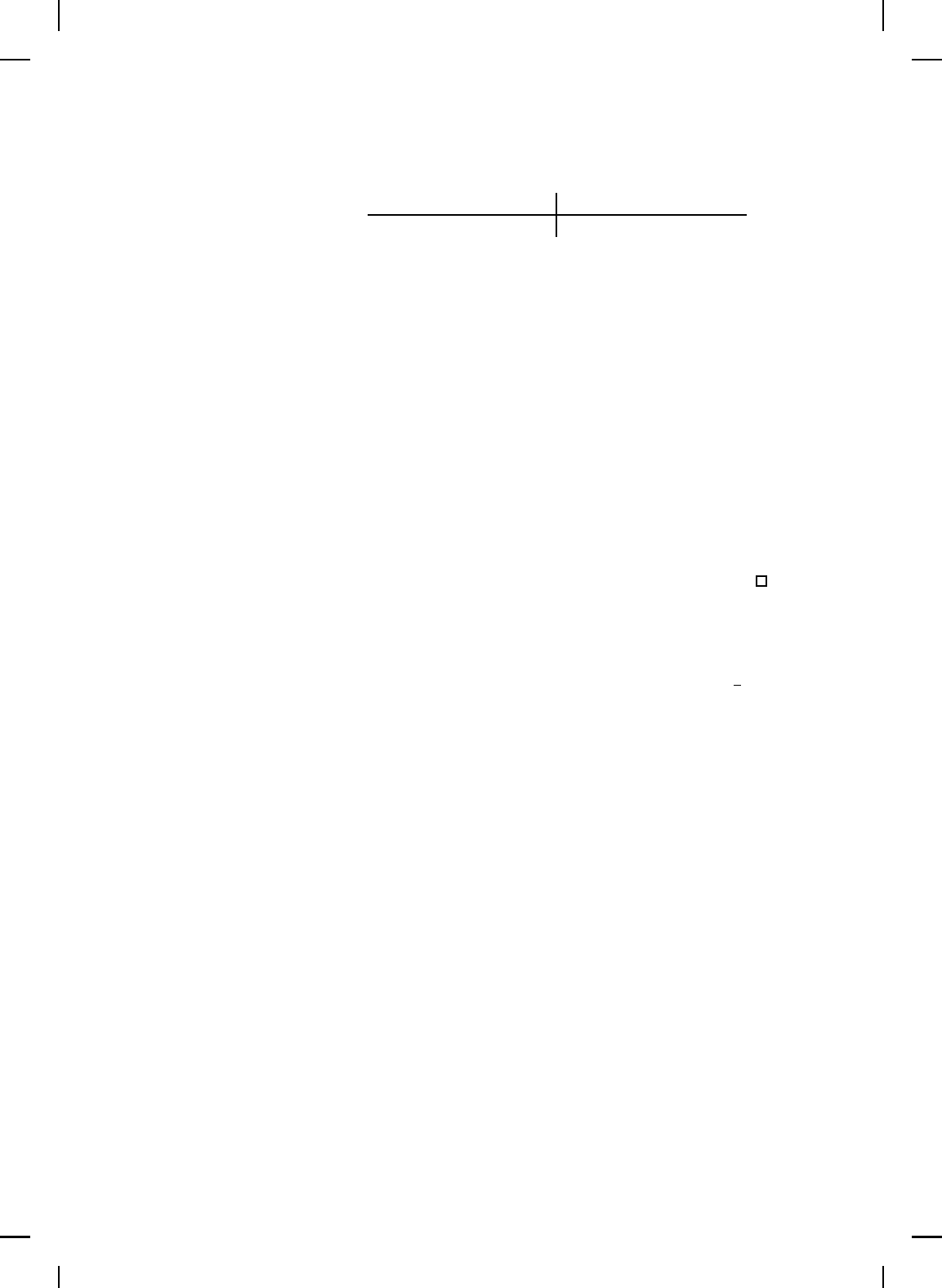
NonlinearBook10pt November 20, 2007
726 CHAPTER 12
given by
(I + G(s)∆)
−1
G(s) ∼
A − B∆(I + D∆)
−1
C B − B∆(I + D∆)
−1
D
(I + D∆)
−1
C (I + D∆)
−1
D
.
Suppose that, ad absurdum, (I +G(s)∆)
−1
G(s) is not asymptotically stable
so that A − B∆(I + D∆)
−1
C is not Hurwitz. Sin ce by assump tion G
s
(s)
is asymptotically stable it follows that A −BM
1
(I + DM
1
)
−1
C is Hurwitz.
Hence, there exists ε ∈ (0, 1) such that A − B∆
ε
(I + D∆
ε
)
−1
C has an
eigenvalue ˆω on the imaginary axis, where ∆
ε
△
= ε∆ + (1 − ε)M
1
.
Next, note that
det(I + G(ˆω)∆
ε
)
= det[I + C(ˆωI − A)
−1
B∆
ε
+ D∆
ε
]
= det(I + D∆
ε
)
−1
det[I + (I + D∆
ε
)
−1
C(ˆωI − A)
−1
B∆
ε
]
= det(I + D∆
ε
)
−1
det(ˆωI − A)
−1
det[ˆωI − (A −B∆
ε
(I + D∆
ε
)
−1
C]
= 0.
However, since ∆
ε
∈ ∆ and det(I + G(ˆω)M
1
) 6= 0, Lemma 12.1 with ω = ˆω
implies that det(I + G(ˆω)∆
ε
) 6= 0, which is a contradiction.
Next, we specialize Theorem 12.1 to the case of norm-bounded
uncertainty in order to draw connections with th e structured singular value
for real and complex block-structured uncertainty. Letting M
1
= −γ
−1
I and
M
2
= γ
−1
I, where γ > 0, it follows that M = 2γ
−1
I so that M
−1
=
1
2
γI.
The set ∆ thus becomes
∆
γ
= {∆ ∈ ∆
bs
: −γ
−1
I ≤ ∆ ≤ γ
−1
I}.
Now, ∆ ∈ ∆
γ
if and only if σ
max
(∆) ≤ γ
−1
. Therefore, ∆
γ
is given by
∆
γ
= {∆ ∈ ∆
bs
: σ
max
(∆) ≤ γ
−1
}.
Alternatively, one can also consider the case where there may exist ∆ ∈ ∆
γ
such that ∆ 6= ∆
∗
and still arrive at ∆ ∈ ∆
γ
for the case where M
1
=
−γ
−1
I and M
2
= γ
−1
I. In this case, it can be shown that Lemma 12.1
also holds (see P roblem 12.2). For the remainder of this section we consider
uncertainties ∆ ∈ ∆
γ
such that ∆ 6= ∆
∗
.
Now, we consider a special case of the sets ∆
bs
, D, and N where
∆ ∈ ∆
bs
. In particular, let ∆
bs
be th e set of block-structured matrices w ith
possibly repeated real scalar entries, complex scalar entries, and complex
blocks given by
∆
bs
= {∆ ∈ C
m×m
: ∆= block−d iag[δ
r
1
I
l
1
, . . . , δ
r
r
I
l
r
; δ
c
r+1
I
l
r+1
, . . . , δ
c
r+q
I
l
r+q
;
∆
C
r+q+1
, . . . , ∆
C
r+c
], δ
r
i
∈ R, i = 1, . . . , r; δ
c
i
∈ C, i = r + 1, . . . , r + q;
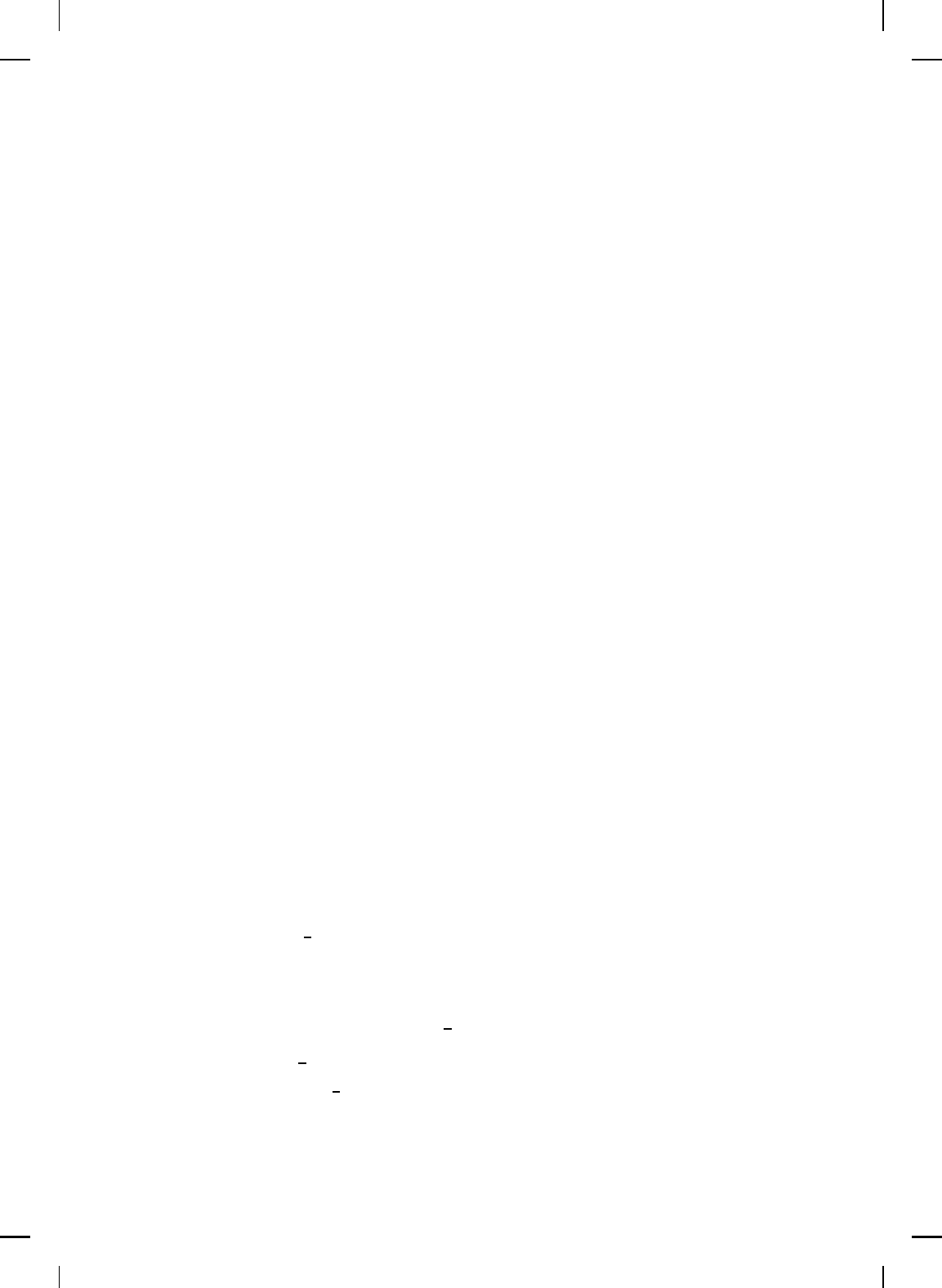
NonlinearBook10pt November 20, 2007
STRUCTURED PARAMETRIC UNCERTAINTY 727
∆
C
i
∈ C
ˆm
i
׈m
i
, i = r + q + 1, . . . , r + c}. (12.24)
Then D and N are the sets of frequency-dependent positive-definite and
Hermitian matrices, respectively, given by
D = {D : R → C
m×m
: D = block−diag[D
1
, . . . , D
r+q
, d
r+q+1
I
ˆm
r+q +1
, . . . ,
d
r+c
I
ˆm
r+c
], 0 < D
i
∈ C
l
i
×l
i
, i = 1, . . . , r + q; 0 < d
i
∈ R,
i = r + q + 1, . . . , r + c}, (12.25)
N = {N : R → C
m×m
: N = block−diag[N
1
, . . . , N
r
, 0
r+1
, . . . , 0
r+c
],
N
i
= N
∗
i
∈ C
l
i
×l
i
, i = 1, . . . , r}. (12.26)
Note that this special case is equivalent to the mixed-µ set considered in
[117]. Furthermore, with D(·) ∈ D and N (·) ∈ N given by (12.25) and
(12.26), respectively, the compatibility conditions required in D and N are
automatically satisfied for ∆
bs
given by (12.24).
Alternatively, let ∆
bs
be given by (12.24) with the additional con-
straint that the complex blocks possess internal matrix structur e. Then D
and N are given by
D = {D : R → C
m×m
: D = block−diag[D
1
, . . . , D
r+c
], 0 < D
i
∈ C
l
i
×l
i
,
i = 1 . . . r + c; D
i
∆
C
i
= ∆
C
i
D
i
, i = r + q + 1, . . . , r + c},
N = {N : R → C
m×m
: N = block−diag[N
1
, . . . , N
r
, 0
r+1
, . . . , 0
r+q
,
N
r+q+1
, . . . , N
r+c
], N
i
= N
∗
i
∈ C
l
i
×l
i
, i = 1, . . . , r + c;
N
i
∆
C
i
= ∆
C
i
∗
N
i
, i = r + q + 1, . . . , r + c}.
For example, if ∆
C
i
= ∆
C
i
∗
∈ ∆
bs
then we can choose D
i
= d
i
I, d
i
∈ R and
N
i
= n
i
I, n
i
∈ R, i = r + q + 1, . . . , r + c.
Next, we present a key lemma which is important in connecting the
absolute stability criterion given in Theorem 12.1 to the mixed-µ upper
bounds.
Proposition 12.1. Let Z(·) ∈ Z, D(·) ∈ D, N(·) ∈ N, and ω ∈ R ∪∞.
Then the following statements are equivalent:
i) He [Z(ω)(
1
2
γI + G
s
(ω))] > 0.
ii) G
∗
(ω)DG(ω) + γ(NG(ω) − G
∗
(ω)N) − γ
2
D < 0.
Proof. Note that He [Z(ω)(
1
2
γI + G
s
(ω))] > 0 is equivalent to
(D − N)(
1
2
γI + G(ω)(I − γ
−1
G(ω))
−1
)
+(
1
2
γI + (I − γ
−1
G
∗
(ω))
−1
G
∗
(ω))(D + N) > 0.
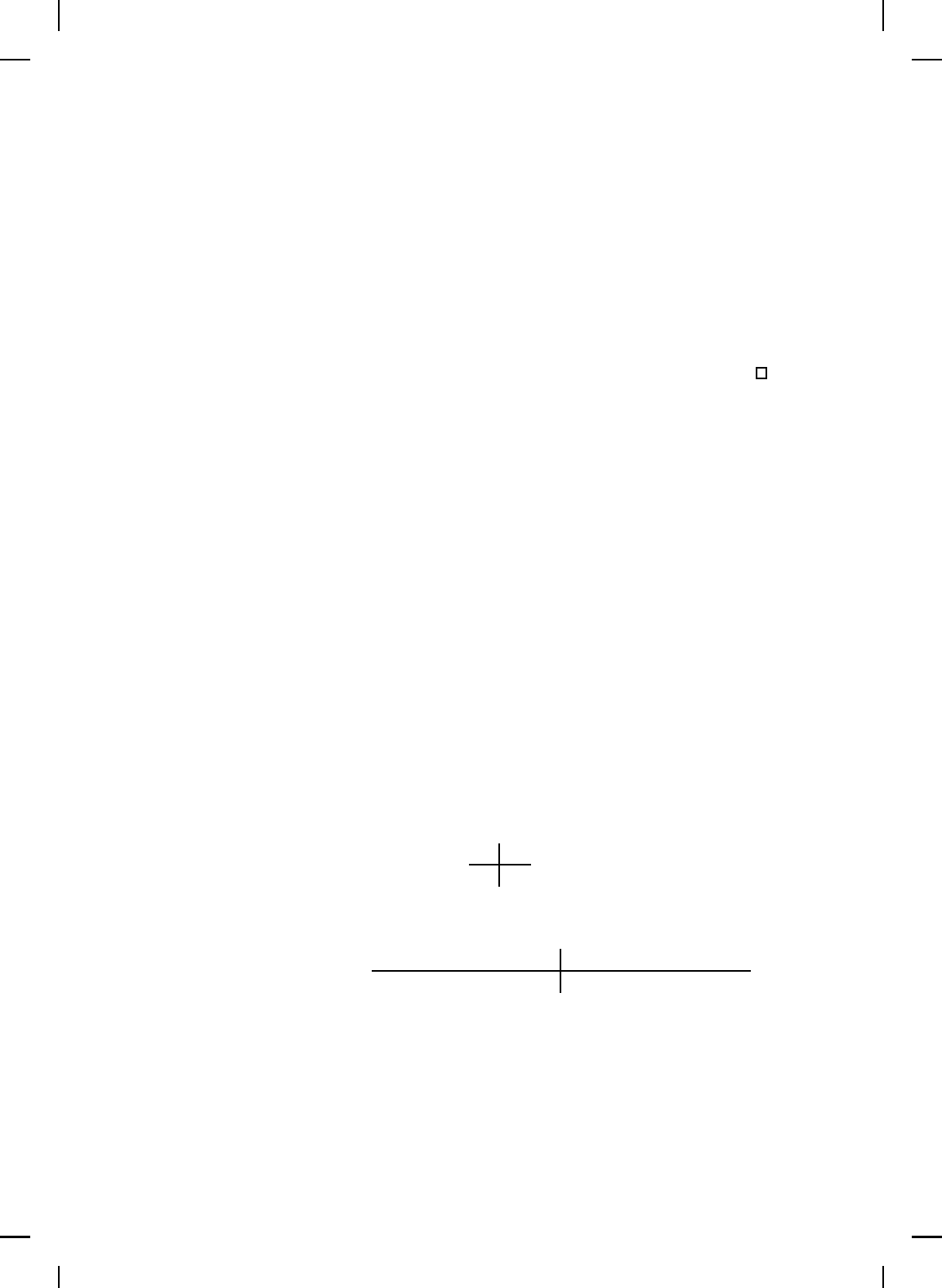
NonlinearBook10pt November 20, 2007
728 CHAPTER 12
Now, premultiplying and postmultiplying the above inequality by I −
γ
−1
G
∗
(ω) and I − γ
−1
G(ω), respectively, we obtain
G
∗
(ω)D(I − γ
−1
G(ω)) −(I − γ
−1
G
∗
(ω))NG(ω)
+G
∗
(ω)N(I − γ
−1
G(ω)) + γ(I − γ
−1
G
∗
(ω))D(I − γ
−1
G(ω))
+(I − γ
−1
G
∗
(ω))DG(ω) > 0,
which, upon collecting terms, further simplifies to
γD − γ
−1
G
∗
(ω)DG(ω) − (NG(ω) − G
∗
(ω)N) > 0,
which is equivalent to (ii).
We now obtain upper boun ds for the structured singular value for real
and complex multiple-block structured uncertainty. These bounds are based
upon the absolute stability criterion of Theorem 12.1 for norm-bounded,
block-structured uncertain matrices. The stru ctured singular value [117] of
a complex matrix G(ω) for mixed real and complex uncertainty is defined
by µ(G(ω))
△
= 0 if det(I + G(ω)∆) 6= 0, ∆ ∈ ∆
bs
, and
µ(G(ω))
△
=
min
∆∈∆
bs
{σ
max
(∆) : det (I + G(ω)∆) = 0}
−1
, (12.27)
otherwise. Hence, a necessary and sufficient condition for robust stability
of th e feedb ack interconn ection of G(s) and ∆ is given by the following
theorem. For the statement of this result we assume that the feedback
interconnection of G(s) and ∆ is well posed for all ∆ ∈ ∆
γ
.
Theorem 12.2. Let γ > 0 and s uppose G(s) is asymptotically stable.
Then the negative feedback interconnection of G(s) and ∆ is asymptotically
stable for all ∆ ∈ ∆
γ
if and only if
µ(G(ω)) < γ, ω ∈ R ∪ ∞. (12.28)
Proof. Let
G(s) ∼
A B
C D
,
where A is Hurwitz, and suppose the negative f eedback interconn ection of
G(s) and ∆ given by
(I + G(s)∆)
−1
G(s) ∼
A − B∆(I + D∆)
−1
C B − B∆(I + D∆)
−1
D
(I + D∆)
−1
C (I + D∆)
−1
D
is asymptotically stable for all ∆ ∈ ∆
γ
. Next, note that, for all ∆ ∈ ∆
γ
and ω ∈ R ∪ ∞
det[I + G(ω)∆]
= det[I + (C(ωI − A)
−1
B + D)∆]
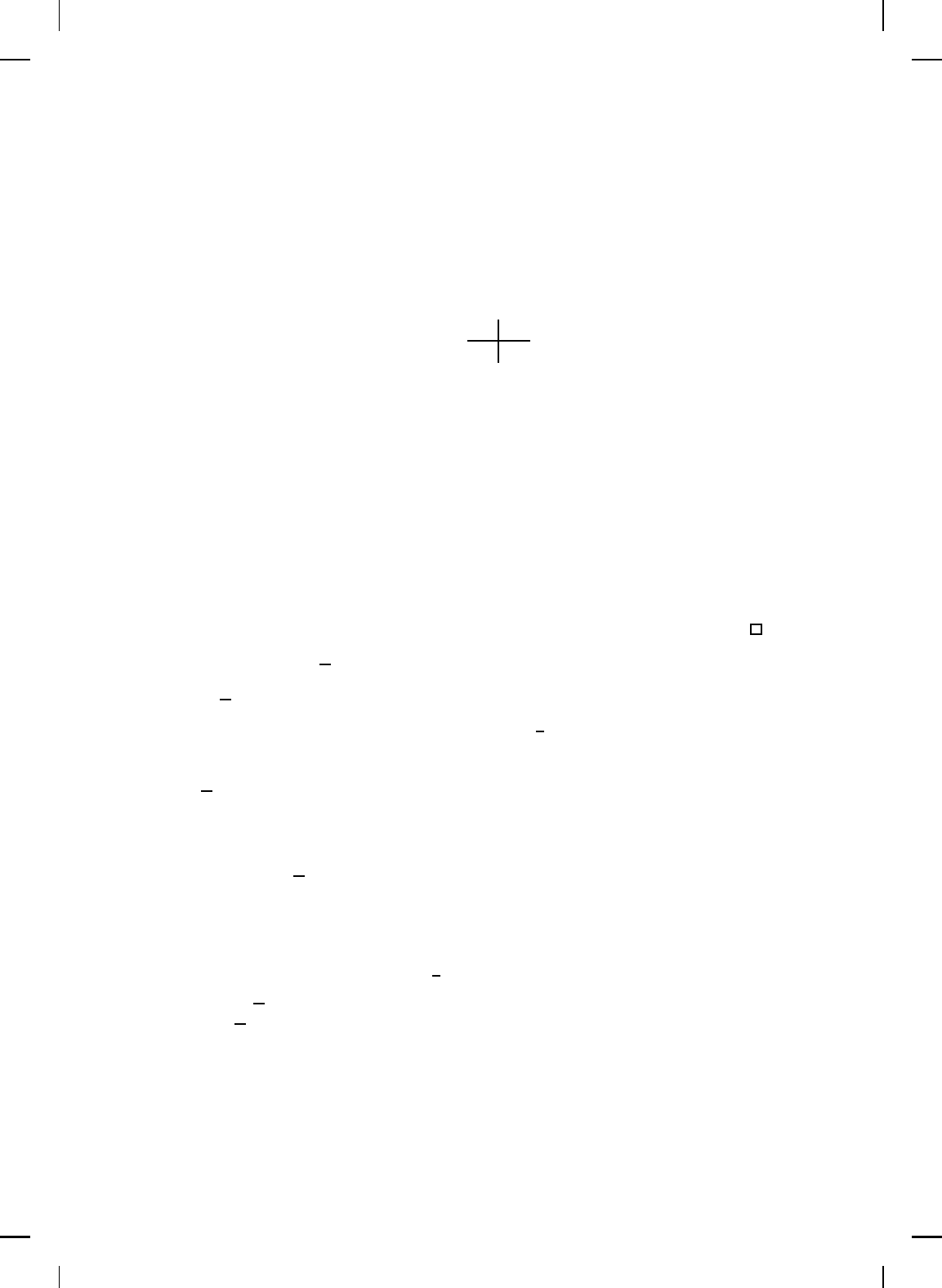
NonlinearBook10pt November 20, 2007
STRUCTURED PARAMETRIC UNCERTAINTY 729
= det(I + D∆)det[I + (ωI − A)
−1
B∆(I + D∆)
−1
C]
= det(I + D∆)det(ωI − A)
−1
det[ωI − (A − B∆(I + D∆)
−1
C)]
6= 0.
Hence, by definition µ(G(ω)) < γ for all ω ∈ R ∪∞.
Conversely, suppose µ(G(ω)) < γ for all ω ∈ R ∪ ∞ and assu me that
G(s) ∼
A B
C D
is minimal. Then, by assumption, det(I + G(∞)∆) = det(I + D∆) 6= 0 for
all ∆ ∈ ∆
γ
. Now, ad absurdum, su ppose there exists ∆ ∈ ∆
γ
such that
(I + G(s)∆)
−1
G(s) is not asymptotically stable, and hence, A − B∆(I +
D∆)
−1
C is not Hurwitz. Since G(s) is assumed to be asymptotically stable
it follows that A is Hurwitz, and hence, there exists ε ∈ (0, 1) such that
A − εB∆(I + εD∆)
−1
C has an imaginary eigenvalue ˆω. Hence,
det[I + εG(ˆω)∆]
= det(I + εD∆)det(ˆωI − A)
−1
det[ˆωI − (A − εB∆(I + εD∆)
−1
C)]
= 0.
However, since ε∆ ∈ ∆
γ
it follows from the definition of µ(G(ω)) th at
det[I + εG(ˆω)∆] 6= 0, w hich is a contradiction.
Next, define µ(G(ω)) by
µ(G(ω))
△
= inf{γ > 0 : there exists Z(·) ∈ Z such that
He [Z(ω)(
1
2
γI + G
s
(ω))] > 0}, (12.29)
or, equivalently, using Proposition 12.1
µ(G(ω)) = inf{γ > 0 : there exist D(·) ∈ D and N(·) ∈ N such that
G
∗
(ω)DG(ω) + γ(NG(ω) − G
∗
(ω)N) − γ
2
D < 0}.
(12.30)
To show that µ(G(ω)) is an upper bound to µ(G(ω)), we require the
following immediate result.
Lemma 12.2. Let ω ∈ R ∪ ∞. If th ere exists Z(·) ∈ Z such that
He[Z(ω)(
1
2
γI + G
s
(ω))] > 0, (12.31)
then γ ≥ µ(G(ω)) and det(I + G(ω)∆) 6= 0 for all ∆ ∈ ∆
γ
. Conversely,
if γ > µ(G(ω)) then there exists Z(·) ∈ Z such that (12.31) holds and
det (I + G(ω)∆) 6= 0 for all ∆ ∈ ∆
γ
.
Proof. Suppose there exists Z(·) ∈ Z such that (12.31) holds. Sin ce
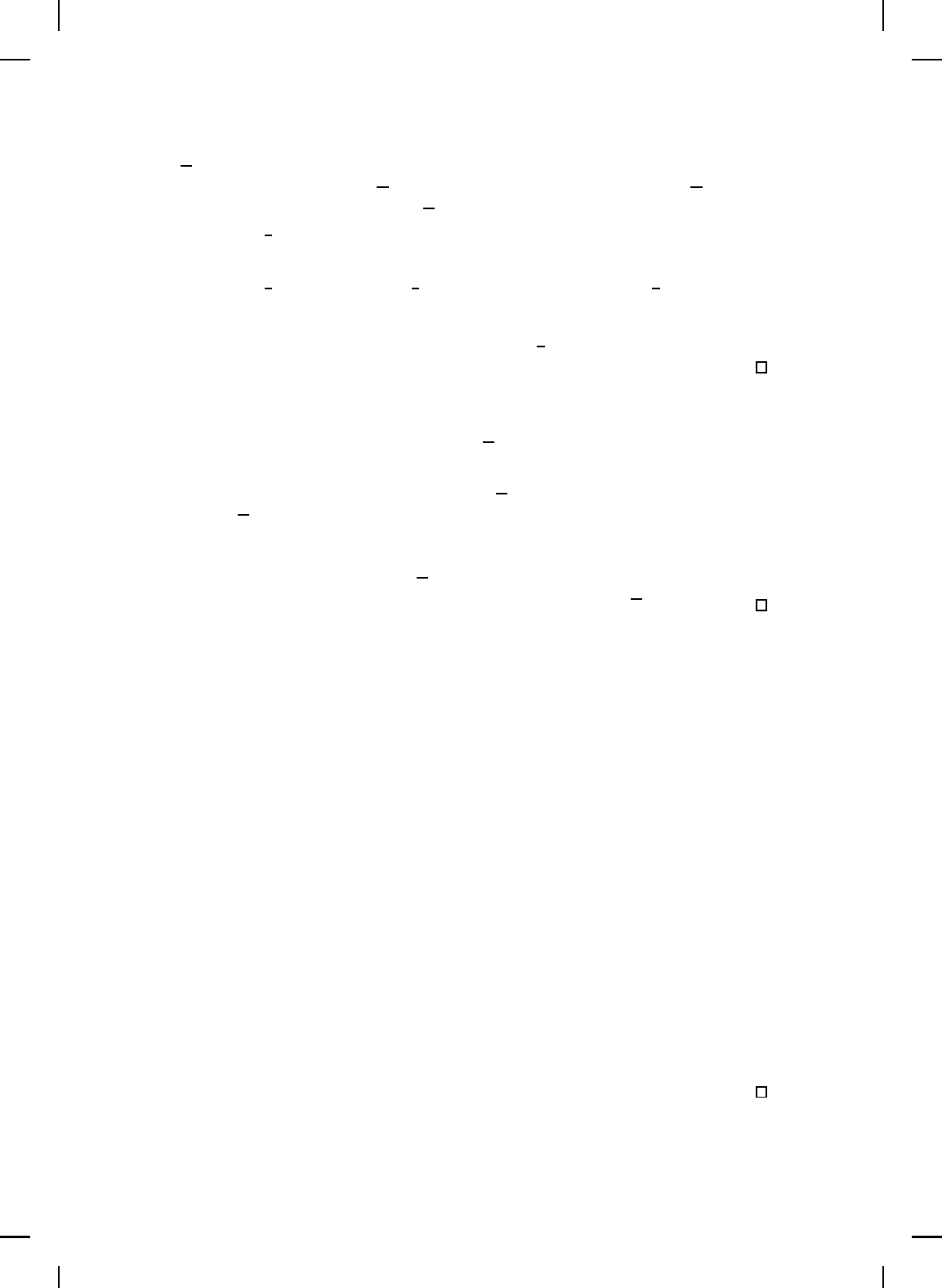
NonlinearBook10pt November 20, 2007
730 CHAPTER 12
µ(G(ω)) is the infimum over all γ such that there exists Z(·) ∈ Z and (12.31)
holds, it follows that γ ≥ µ(G(ω)). Conversely, suppose that γ > µ(G(ω)).
Then there exists ˆγ satisfying µ(G(ω)) ≤ ˆγ < γ and Z(·) ∈ Z such that
He [Z(ω)(
1
2
ˆγI+G
s
(ω))] > 0. Now, using the fact that D(ω) = He Z(ω) ≥
0, it follows that
He [Z(ω)(
1
2
γI + G
s
(ω))] =
1
2
(γ − ˆγ)He Z(ω) + He [Z(ω)(
1
2
ˆγI + G
s
(ω))]
> 0.
Finally, applying L emm a 12.1 with M
−1
=
1
2
γI and ∆ = ∆
γ
, it follows
that det (I + G(ω)∆) 6= 0 for all ∆ ∈ ∆
γ
.
Theorem 12.3. Let ω ∈ R ∪ ∞ and let G(ω) be a complex matrix.
Then
µ(G(ω)) ≤ µ(G(ω)). (12.32)
Proof. Suppose,ad absurdum, that µ(G(ω)) < µ(G(ω)) and let γ > 0
satisfy µ(G(ω)) < γ ≤ µ(G(ω)). Then, from the definition of µ(G(ω))
it follows that min
∆∈∆
bs
{σ
max
(∆) : det(I + G(ω)∆) = 0} ≤ γ
−1
. It thus
follows that there exists ∆ ∈ ∆
γ
such that det (I + G(ω)∆) = 0. However,
using Lemma 12.2 we know if µ(G(ω)) < γ, then det (I + G(ω)∆) 6= 0 for
all ∆ ∈ ∆
γ
, which is a contradiction. Hence, µ(G(ω)) ≤ µ(G(ω)).
Next, in order to provide a s ystematic comparison of mixed-µ bounds
for a fixed, internally block-structured u ncertainty set ∆
bs
define µ
i
(G(ω))
by
µ
i
(G(ω))
△
= inf{γ > 0 : there exist D(·) ∈ D
i
and N (·) ∈ N
i
such that
G
∗
(ω)DG(ω) + γ(NG(ω) − G
∗
(ω)N) −γ
2
D < 0}, (12.33)
where D
i
, N
i
correspond to the pairs of frequency-dependent scaling matrix
sets tailored to a fixed uncertainty structure ∆
bs
. The following result is
immediate.
Proposition 12.2. Let G(ω) be a complex matrix and let D
i
, N
i
and
D
j
, N
j
be frequency-dependent scaling matrix sets associated with a fixed
uncertainty structure ∆
bs
. Suppose D
j
⊆ D
i
and N
j
⊆ N
i
. Then
µ
i
(G(ω)) ≤ µ
j
(G(ω)). (12.34)
Proof. S uppose, ad absurdum, µ
j
(G(ω)) < µ
i
(G(ω)) and let some
γ > 0 satisfy µ
j
(G(ω)) < γ ≤ µ
i
(G(ω)). Then by definition of µ
j
(G(ω))
there exist D(·) ∈ D
j
and N(·) ∈ N
j
such that G
∗
(ω)DG(ω)+γ(NG(ω)−
G
∗
(ω)N) − γ
2
D < 0. Now, since D
j
⊆ D
i
and N
j
⊆ N
i
, it follows that
D(·) ∈ D
i
and N(·) ∈ N
i
, and hence, µ
i
(G(ω) < γ, which is a contradiction.
Hence, µ
i
(G(ω)) ≤ µ
j
(G(ω)).
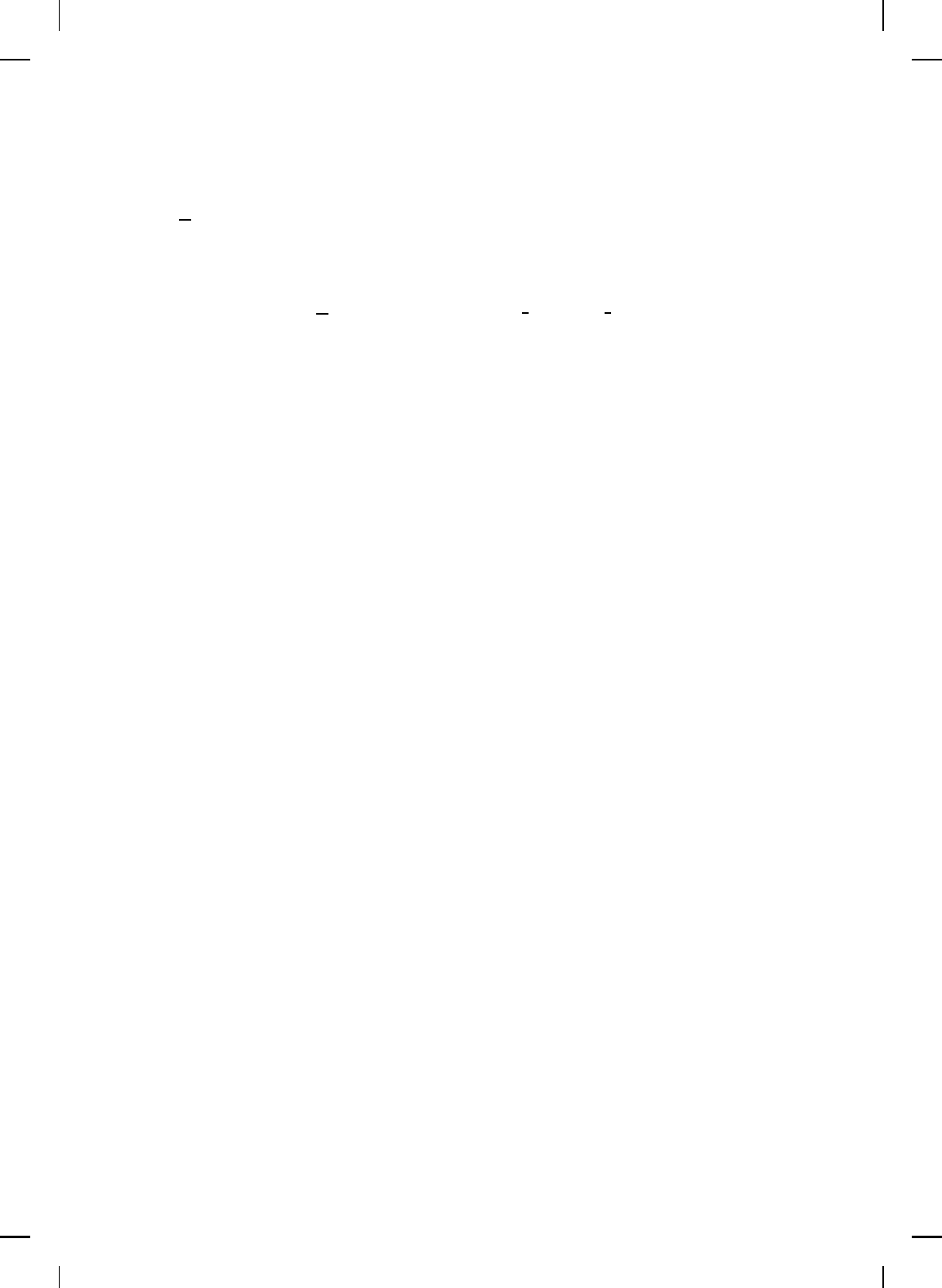
NonlinearBook10pt November 20, 2007
STRUCTURED PARAMETRIC UNCERTAINTY 731
Finally, note that in the complex uncertainty case, that is, r = 0, we
take D > 0 and N = 0 so that the complex-µ upper bound [110] given by
µ(G(ω)) =
inf{γ > 0 : there exists D(·) ∈ D such that G
∗
(ω)DG(ω) − γ
2
D < 0},
or, equivalently,
µ(G(ω)) = inf
D(·)∈D
σ
max
(D
1
2
G(ω)D
−
1
2
) (12.35)
is recovered. In this case, the upper bound can be computed via a convex
optimization problem [396].
12.3 Robust Stability Analysis of Non linear Uncertain Systems
via Parameter-Dependent Lyapunov Functions
In this s ection, we present sufficient conditions for robust stability f or a
class of nonlinear uncertain systems. Specifically, we extend the framework
of Chapter 11 in order to address stability of a class of nonlinear systems
with time-invariant structured uncertainty. Here, we restrict our attention
to time-invariant infinite-horizon systems. Once again, for the class
of nonlinear uncertain systems considered we assume that the required
properties for the existence and uniqueness of s olutions are satisfied. For the
following result, let D ⊂ R
n
be an open set, assume 0 ∈ D, let L : D → R,
and let F ⊂ {f : D → R
n
: f(0) = 0} denote the class of uncertain n onlinear
systems with f
0
(·) ∈ F defining the nominal nonlinear system.
Theorem 12.4. Consider the nonlinear uncertain dynamical system
˙x(t) = f(x(t)), x(0) = x
0
, t ≥ 0, (12.36)
where f (·) ∈ F, with performance functional
J
f
(x
0
)
△
=
Z
∞
0
L(x(t))dt. (12.37)
Furth ermore, assume there exist functions Γ : D → R and V
I
, V
∆f
, V : D →
R, where V
I
(·) and V
∆f
(·) are continuously differentiable functions such that
V
I
(x) + V
∆f
(x) = V (x) for all x ∈ D and
V (0) = 0, (12.38)
V (x) > 0, x ∈ D, x 6= 0, (12.39)
V
′
(x)f(x) ≤ V
′
I
(x)f
0
(x) + Γ(x), x ∈ D, f(·) ∈ F,
(12.40)
V
′
I
(x)f
0
(x) + Γ(x) < 0, x ∈ D, x 6= 0, (12.41)
L(x) + V
′
I
(x)f
0
(x) + Γ(x) = 0, x ∈ D, (12.42)
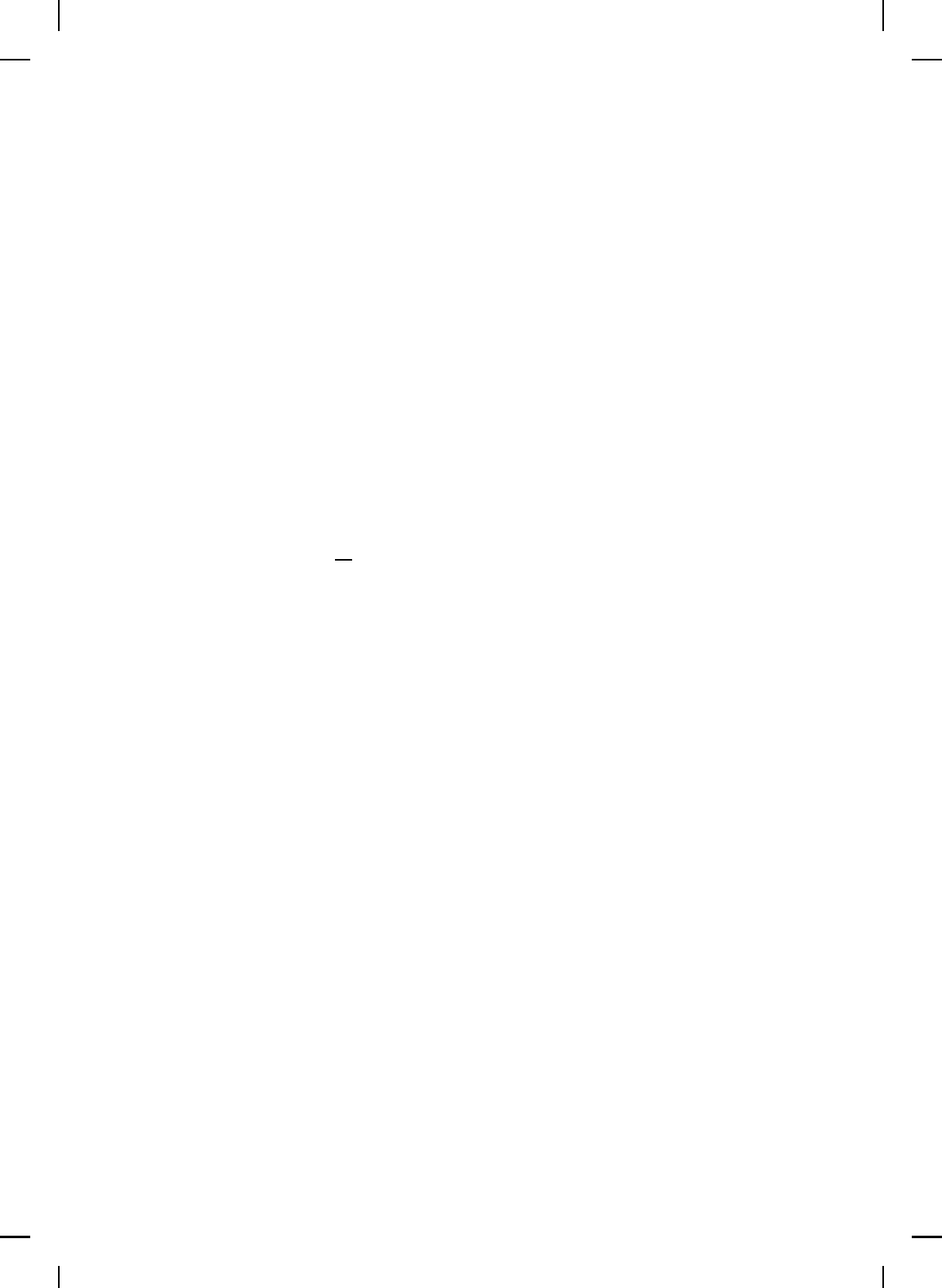
NonlinearBook10pt November 20, 2007
732 CHAPTER 12
where f
0
(·) ∈ F defines the nominal nonlinear system. Then th e zero
solution x(t) ≡ 0 to (12.36) is locally asymptotically stable for all f(·) ∈ F,
and there exists a neighborhood of the origin D
0
⊆ D such that
J
f
(x
0
) ≤ J(x
0
) = V (x
0
), f(·) ∈ F, x
0
∈ D
0
, (12.43)
where
J(x
0
)
△
=
Z
∞
0
[L(x(t)) + Γ(x(t)) −V
′
∆f
(x(t))f
0
(x(t))]dt, (12.44)
and where x(t), t ≥ 0, is the solution to (12.36) with f (x(t)) = f
0
(x(t)).
Finally, if D = R
n
and
V (x) → ∞ as kxk → ∞, (12.45)
then the zero solution x(t) ≡ 0 to (12.36) is globally asymp totically stable
for all f(·) ∈ F.
Proof. Let f (·) ∈ F and x(t), t ≥ 0, satisfy (12.36). Then
˙
V (x(t))
△
=
d
dt
V (x(t)) = V
′
(x(t))f(x(t)), t ≥ 0. (12.46)
Hence, it follows from (12.40) and (12.41) that
˙
V (x(t)) < 0, t ≥ 0, x(t) 6= 0. (12.47)
Thus , from (12.38), (12.39), and (12.47) it follows that V (·) is a Lyapunov
function for (12.36), which proves local asymp totic stability of the zero
solution x(t) ≡ 0 to (12.36) for all f(·) ∈ F. Consequently, x(t) → 0 as
t → ∞ for all initial conditions x
0
∈ D
0
for some neighborhood of the origin
D
0
⊂ D. Now, (12.46) implies that
0 = −
˙
V (x(t)) + V
′
(x(t))f(x(t)), t ≥ 0,
and h en ce, using (12.40) and (12.42),
L(x(t)) = −
˙
V (x(t)) + L(x(t)) + V
′
(x(t))f(x(t))
≤ −
˙
V (x(t)) + L(x(t)) + V
′
I
(x(t))f
0
(x(t)) + Γ(x(t))
= −
˙
V (x(t)).
Now, integrating over [0, t) yields
Z
t
0
L(x(s))ds ≤ −V (x(t)) + V (x
0
).
Letting t → ∞ and noting that V (x(t)) → 0 f or all x
0
∈ D
0
yields J
f
(x
0
) ≤
V (x
0
).
Next, let x(t), t ≥ 0, satisfy (12.36) with f(x(t)) = f
0
(x(t)). Then it
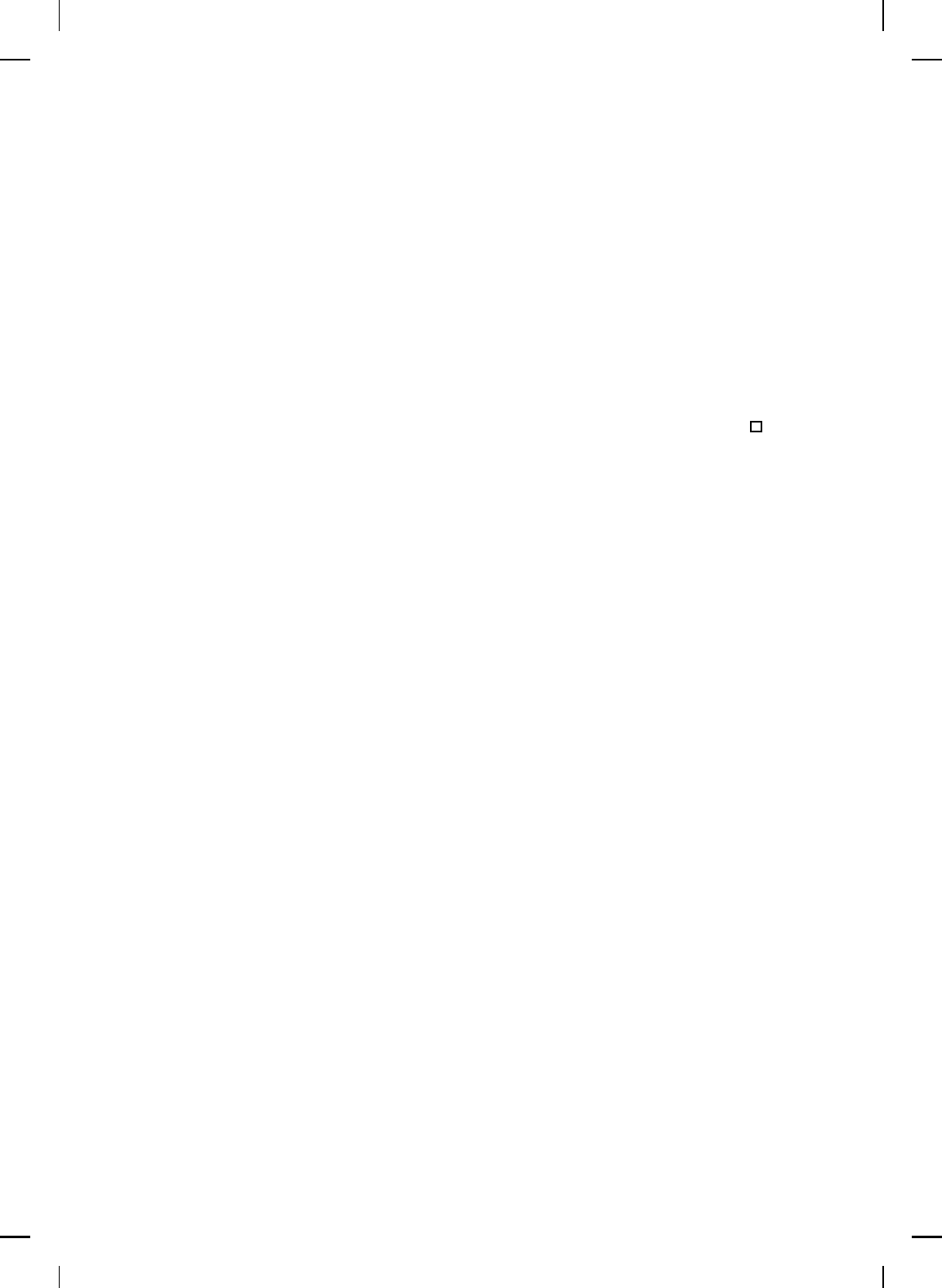
NonlinearBook10pt November 20, 2007
STRUCTURED PARAMETRIC UNCERTAINTY 733
follows from (12.42) that
L(x(t)) + Γ(x(t)) −V
′
∆f
(x(t))f
0
(x(t)) = −
˙
V (x(t)) + L(x(t))
+V
′
I
(x(t))f
0
(x(t)) + Γ(x(t))
= −
˙
V (x(t)).
Integrating over [0, t) yields
Z
t
0
[L(x(s)) + Γ(x(s)) −V
′
∆f
(s)f
0
(x(t))]ds = −V (x(t)) + V (x
0
).
Now, letting t → ∞ yields J(x
0
) = V (x
0
). Finally, for D = R
n
global
asymptotic stability of the solution x(t) = 0, t ≥ 0, for all f(·) ∈ F is a
direct consequence of the radially unbounded condition (12.45) on V (x).
Theorem 12.4 is an extension of Theorem 8.1. Specifically, if V
∆f
(x) =
0 and F consists of only the nominal nonlinear system f
0
(·), then Γ(x) = 0
for all x ∈ D satisfies (12.40), and hence, J
f
0
(x
0
) = J(x
0
). In this case,
Theorem 12.4 specializes to Theorem 8.1. Alternatively, s etting V
∆f
(x) = 0
and allowing f (·) ∈ F we recover Theorem 11.1.
Next, we specialize Theorem 12.4 to nonlinear uncertain systems of
the f orm
˙x(t) = f
0
(x(t)) + ∆f(x(t)), x(0) = x
0
, t ≥ 0, (12.48)
where f
0
: D → R
n
satisfies f
0
(0) = 0 and f
0
+ ∆f ∈ F. Here, F is such
that
F ⊂ {f
0
+ ∆f : D → R
n
: ∆f ∈ ∆}, (12.49)
where ∆ is a given nonlinear uncertainty set of nonlinear perturbations ∆f
of the nominal system dyn amics f
0
(·) ∈ F. Since F ⊂ {f : D → R
n
:
f(0) = 0} it follows that ∆f (0) = 0 for all ∆f ∈ ∆.
Corollary 12.1. Consider the dynamical system given by (12.48) where
∆f(·) ∈ ∆, with performance functional (12.37). Furthermore, assume there
exist functions Γ : R
n
→ R and V
I
, V
∆f
, V : R
n
→ R, where V
I
(·) and V
∆f
(·)
are continuously differentiable functions such that V
I
(x) + V
∆f
(x) = V (x)
for all x ∈ R
n
and
V (0) = 0, (12.50)
V (x) > 0, x ∈ R
n
, x 6= 0, (12.51)
V
′
I
(x)∆f(x) ≤ Γ(x) −V
′
∆f
(x)(f
0
(x) + ∆f(x)), x ∈ R
n
, ∆f(·) ∈ ∆,
(12.52)
V
′
I
(x)f
0
(x) + Γ(x) < 0, x ∈ R
n
, x 6= 0, (12.53)
L(x) + V
′
I
(x)f
0
(x) + Γ(x) = 0, x ∈ R
n
, (12.54)
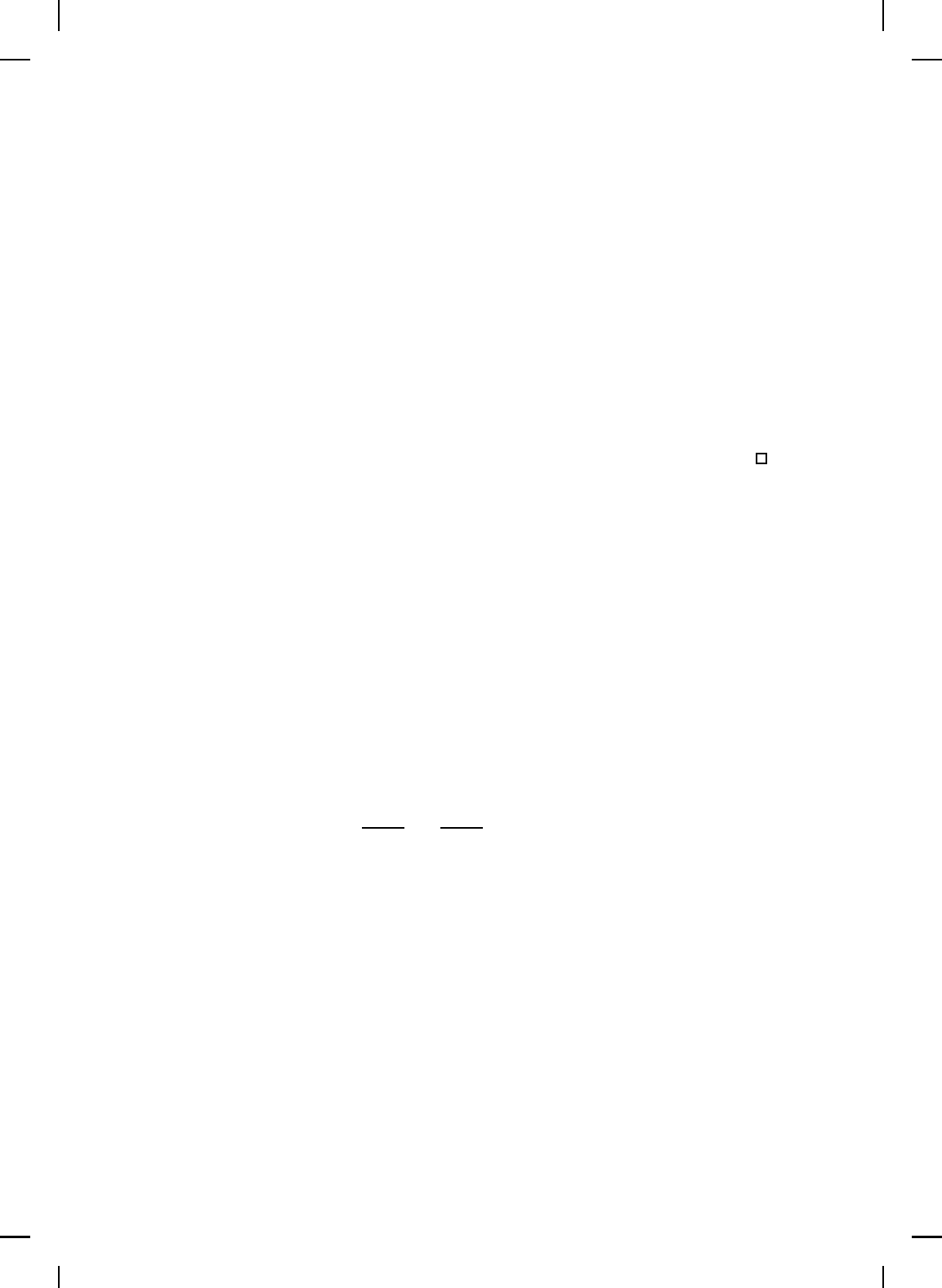
NonlinearBook10pt November 20, 2007
734 CHAPTER 12
and
V (x) → ∞ as kxk → ∞. (12.55)
Then the zero solution x(t) ≡ 0 to (12.48) is globally asymptotically stable
for all ∆f(·) ∈ ∆, and
J
∆f
(x
0
) ≤ J(x
0
) = V (x
0
), ∆f(·) ∈ ∆, (12.56)
where
J(x
0
)
△
=
Z
∞
0
[L(x(t)) + Γ(x(t)) −V
′
∆f
(x(t))f
0
(x(t))]dt, (12.57)
and where x(t), t ≥ 0, is the solution to (12.48) with ∆f (x) ≡ 0.
Proof. The result is a direct consequence of T heorem 12.4 with f (x) =
f
0
(x) + ∆f(x).
Having established the theoretical basis of our approach, we now assign
explicit structure to the set ∆ and the bounding function Γ(·). Specifically,
the uncertainty set ∆ is assum ed to be of the form
F = {f
0
(x)+∆f (x) : ∆f(x) = G
δ
(x)δ(h
δ
(x)), x ∈ R
n
, δ(·) ∈ ∆}, (12.58)
where ∆ satisfies
∆ = {δ(·) ∈ ∆
bs
: [δ(y) − m
1
(y)]
T
[δ(y) − m
2
(y)] ≤ 0, y ∈ R
p
δ
}, (12.59)
and where m
1
(·), m
2
(·) ∈ ∆
bs
are such that m
T
1
(y)m
2
(y) ≤ 0, y ∈ R
p
δ
,
G
δ
: R
n
→ R
n×m
δ
, h
δ
: R
m
δ
→ R
m
δ
is continuously differentiable and
satisfies h
δ
(0) = 0, and
∆
bs
⊂
(
δ : R
m
δ
→ R
m
δ
: δ(0) = 0, δ(·) is continuously differentiable, and
dδ(y)
dy
=
dδ(y)
dy
T
)
. (12.60)
For the structure of ∆ as s pecified by (12.58), the bounding f unction
Γ(·) satisfying (12.52) can now be given a concrete form. For the following
result define the set of compatible scaling matrices H
p
and N
s
by
H
p
△
= {H ∈ P
m
δ
: Hδ(y) = δ(Hy), y ∈ R
m
δ
, δ(·) ∈ ∆
bs
, }, (12.61)
N
s
△
= {N ∈ S
m
δ
: Nδ(y) = δ(Ny), N (δ(y) − m
1
(y)) ≥ 0, y ∈ R
m
δ
,
δ(·) ∈ ∆
bs
, }. (12.62)
Furth ermore, define
˜
h(x)
△
= H[m
1
(h
δ
(x)) + m
2
(h
δ
(x))] + Nh
′
δ
(x)f
0
(x) and
R
0
(x)
△
= 2H − Nh
′
δ
(x)G
δ
(x) − G
T
δ
(x)h
′T
δ
(x)N.
